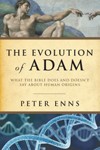 Recently at the Huffington Post, Greg Carey (Professor of New Testament, Lancaster Theological Seminary), published his thoughts on how the Bible itself challenges fundamentalism rather than supports it. The article, with its provocative title, “Where Do ‘Liberal’ Scholars Come From,” has attracted some attention, both pro and con.
Recently at the Huffington Post, Greg Carey (Professor of New Testament, Lancaster Theological Seminary), published his thoughts on how the Bible itself challenges fundamentalism rather than supports it. The article, with its provocative title, “Where Do ‘Liberal’ Scholars Come From,” has attracted some attention, both pro and con.
Many (including me) resonated with Carey’s article, and though some found it unconvincing, Carey is simply rehearsing a well-worn path in western Christianity over the last several hundred years: “I was taught to believe the Bible unequivocally says X, but I just don’t see it, so I am going to stop believing X.”
Fill in X with any one of a number of issues.
I have known many people, and heard of many others, who have come from conservative or moderately conservative backgrounds and whose earlier paradigms have been seriously challenged by the simply process of paying attention to scripture in context–whether the immediate literary context or the historical context. This is especially true of those who have done higher level academic work outside of evangelicalism and fundamentalism, but is by no means restricted to this group.
Why does this happen?
I think it’s because scripture doesn’t line up very well with the conservative paradigm of scripture (some form of inerrancy). That’s why the paradigm needs constant tending and vigilant defending in order to survive.
I mean, there’s a reason why Carey’s phenomenon keeps rearing its head generation after generation. It’s not (as I hear far too often) that the offenders are intellectually naive (or dimwitted) and have been duped or are too spiritually weak kneed to “hold on to the truth.”
The recurring unrest with conservative readings of scripture from within conservative circles suggests that the paradigm is flawed.
My plan over the coming weeks is to invite some biblical scholars from evangelical backgrounds to write about the issue(s) that brought them to reconsider the older paradigms they were taught, to let us in on their own “aha” moments that brought them to the brink of having to make a decision between staying put and moving on–and why they chose to move on.
I’ll keep you posted, of course.












